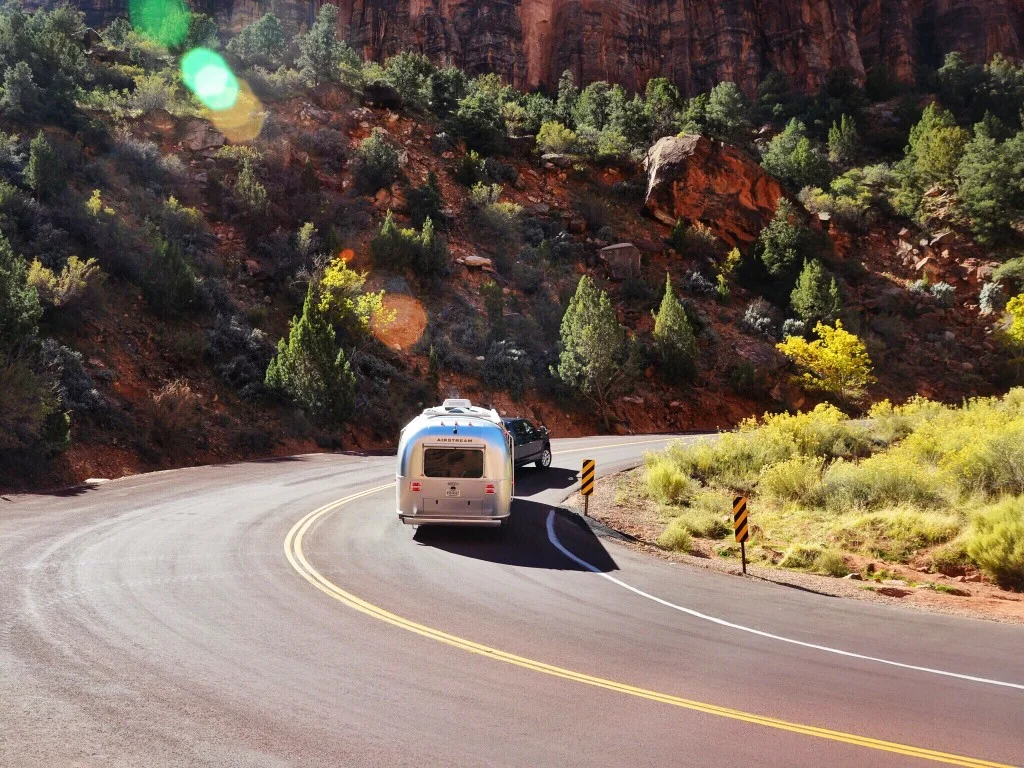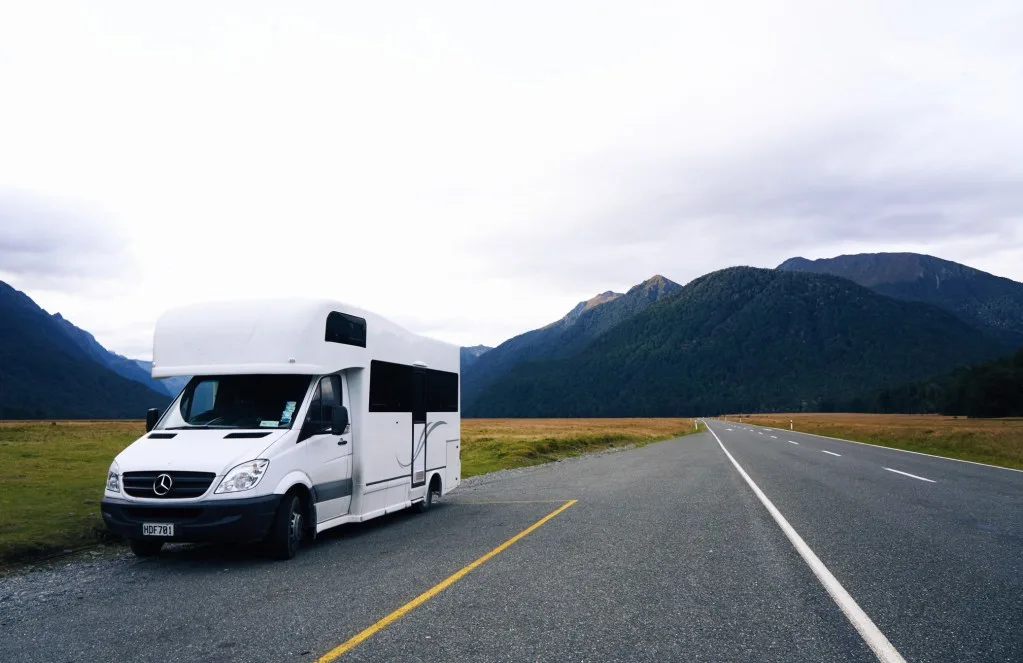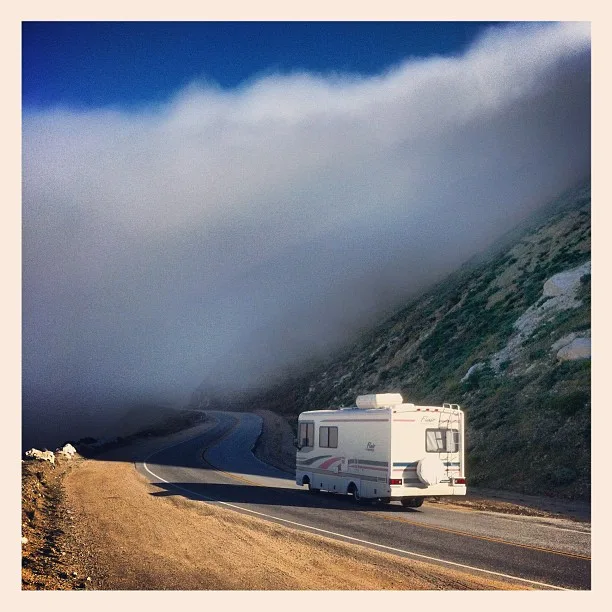What’s the Ideal RV Highway Speed?
How much speed is too much while driving or towing an RV on the highway?
This is a question many RVers ask themselves when in a hurry to get to their campsites. The excitement of a camping adventure can easily cause RVers to push it a little.
Today we’ll take a closer look at the ideal highway speed for RVing.
Let’s get started!

How Fast Should You Drive Your RV on a Highway?
While speed limits vary quite a bit based on the particular state or road, an optimal highway RV speed is between 63-65 MPH. How fast you can drive and how fast you should drive are two different questions. While RVing, you should do everything in your power to drive as safely as possible for you, your passengers, and others on the road.
Keep in mind that an RV can weigh upwards of 20,000 pounds, and it’s all too easy to lose control. Blown tires or objects in the roadway can send you careening down the highway. When you lose control, it creates a dangerous situation for everyone. Keeping your speed below 63-65 MPH can give you time to respond and stay in control.
With rising costs at the fuel pump, conserving fuel means filling up your RV less. Studies show that you can even gain 10-15% in fuel efficiency by keeping your speed down. Unfortunately, there’s a sharp decline in fuel efficiency as your speed increases. So while driving faster may get you there faster, you’ll lose any time you’re saving if you have to fill up more often.

Do RVs Have to Follow Truck Speed Limits?
Most states exempt RVs from following truck speed limits on highways as RVs aren’t commercial vehicles. However, several states don’t make this distinction. That includes Arkansas, California, Idaho, Indiana, Michigan, Oregon, and Washington. In these states, RVs must follow the posted speed limits for trucks or commercial vehicles.
Individual states make the rules regarding regulations and driving laws. This means you should be familiar with the rules and regulations regarding RV speeds for any states where you plan to drive. Ignorance of laws or regulations won’t prevent you from getting a ticket.
Do You Have to Drive the Speed Limit?
You may occasionally spot a “minimum speed limit” sign on the highway. These will often be along congested highways where driving too slowly can pose a traffic hazard. However, most states don’t have laws about how slowly you can drive. Many states leave how slow is too slow up to police. You driving below the speed limit should not impede traffic or cause congestion.
We recommend driving between 63-65 MPH for optimal fuel efficiency and also safety. Unfortunately, many interstate highways have speeds that far exceed this, which is considered unsafe for RVs. In addition, some RV tire ratings are insufficient for excessive speeds. If you find yourself on one of these highways, maintain your safe speed and get into the far right lane. This position allows you to be out of the way so faster traffic can maneuver around you.
However, if you’re driving slowly enough that it’s causing a line of traffic behind you, you might need to pull over. Some states will ticket drivers if they’re driving below the speed limit and don’t pull over to allow traffic to pass.

Better to Be Safe
It’s better to arrive late than not at all. Speeding while driving an RV, especially on a highway, can be incredibly dangerous and ruin your camping trip.
Speeding won’t get you to your campsite so much faster that it warrants excessive speeds. Keeping your speed in check while driving your RV can help you stay on the road for many adventures to come. What’s your rule of thumb when it comes to highway speeds with your RV?
Discover the Best Free Camping Across the USA
To be honest with you, we hate paying for camping. There are so many free campsites in America (with complete privacy).
You should give it a try!
As a matter of fact, these free campsites are yours. Every time you pay federal taxes, you’re contributing to these lands.
Become a FREE CAMPING INSIDER and join the 100,000 campers who love to score the best site!
We’ll send you the 50 Best Free Campsites in the USA (one per state). Access the list by submitting your email below:
We ascribe to the 60-65 mph rule as a maximum highway speed limit, and follow the trucker posted limits. We simply wave as people pass us and don’t worry about it because it’s not a race.
I generally aim for 65mph, but watch on interstates where the speed limit is 80, and some others are driving 85-90.
My take is that if I am in the right lane and the left lane is open, I have little obligation to “get out of the way.”
In California, the game is different: if you have 5 vehicles behind you, you MUST pull over at a safe opportunity and let them pass. I understand but remain amazed at our culture’s collective race to nowhere.
This perspective is from a Motorsports Safety Foundation certified driving instructor, and a member of injury prevention committees.
I drive slow. I’m in no hurry. I want to see things and relax and take my time. I try to avoid the interstate and take the back roads. If I have to be on an interstate, I either go exactly the speed limit or 55, whichever is slower. If the speed limit is 80, I go 55. If the speed limit is 90, I go 55.
From the old school, “55” super conservative on fuel. Less stress, and stay off of interstates as much as possibe, last trip of 9 weeks, AZ,NM, CO, NB,MONTANA, WY, ID, UT virtual no freeways till UT and AZ
I have Toyo M154 tires that have a Speed rating of N (87mph). So the closer you get to the limit of your tire speed rating, the more chance of a blowout.
We like the 60-65 range on our trips.
I believe most RV trailers, fifth wheels and motorhomes except diesel pushers should never travel faster than 60mph. For two important reasons safety and fuel economy.
I have been an RVer for almost 50yrs and am still alive with no accidents !!!
People, in general, do not realize that if you travel at 60 mph for 4 hours you will go 280 miles. If you travel for the same time at 60 ,mph you will go 240 miles. The difference in miles means you would save a measly 30 minutes. That will probably mean an extra fuel stop or at least a longer one. Slower is safer and cheaper,,, especially when traveling with children.